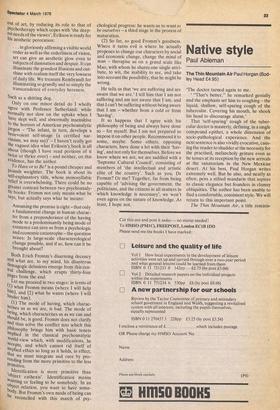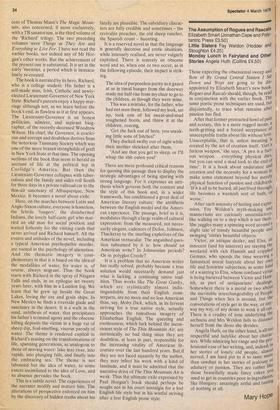Native style
Paul Ableman
The Thin Mountain Air Paul Horgan (Bodley Head £4.95)
The doctor turned again to me.
"That's better," he remarked genially and the emphasis set him to coughing – the liquid, shallow, self-sparing cough of the tubercular. Covering his mouth, he shook his head to discourage alarm.'
That 'self-sparing' cough of the tubercular doctor is masterly, defining, in a single compound epithet, a whole dimension of socio-pathological experience. And the next sentence is also vividly evocative, causing the reader to shudder at the necessity for the practised, melancholy gesture even as he tenses at its reception by the new arrivals at the sanatorium in the New Mexican desert. At his best, Paul Horgan writes extremely well. But he also, and nearly as often, pens a stilted mandarin that aspires to classic elegance but founders in clumsy obliquities. The author has been unable to find a comfortable, consistent style. We will return to this important point.
The Thin Mountain Air, a title reminis
cent of Thomas Mann's The Magic Mountain, also concerned, if more exclusively, with a TB sanatorium, is the third volume of the 'Richard' trilogy. The two preceding volumes were Things as They Are and Everything to Live For. I have not read the earlier books, nor indeed any of Mr Horgan's other works. But the achievement of the present one is substantial. It is set in the early 'twenties, a period which is immaculately re-created.
The book is narrated by its hero, Richard, who is a college student. His father is a self-made man, Irish, Catholic and newlyelected Lieutenant-Governor of New York State. Richard's parents enjoy a happy marriage although not, as we learn before the book's end, as flawless as it at first appears. The Lieutenant-Governor is an honest politician, admirer, and aspirant biographer, of the recently-deceased Woodrow Wilson. His chief, the Governor, is avaricious and corrupt and doubtless derives from the notorious Tammany Society which was one of the more brazen strongholds of graft in New York State at that time. The opening sections of the book thus seem to herald an account of life at the political top in Coolidge's America. But then the Lieutenant-Governor collapses with tuberculosis and the family and aides roll South for three days in a private railroad car to the thin-air sanctuary of Albuquerque, New Mexico. It becomes a novel about exile.
Here, on the marches between Latin and Anglo-Saxon culture, everyone is homeless, the febrile lungers', the disinherited Indians, the lovely half-caste girl who married an old man for social position and waited forlornly for the visiting cards that never arrived and Richard himself. All the events and attitudes of the novel, including a typical American psychopathic murder, are rooted in the psychology of alienation. And the thematic imagery is complementary in that it is based on the idea of the modalities of water, for water is, of course, always migrant. Thus the book starts with Richard in the spray of Niagara Falls and ends, in an epilogue set twenty years later, with him in a London fog. We learn that he grew up beside the Great Lakes, loving the ore and grain ships. In New Mexico he finds a riverside glade and sanctuary in the desert. It is a walk in the sand, antithesis of water, that precipitates his father's terminal agony and the obscene killing deposits the victim in a huge vat of sheep dip, foul-smelling, viscous parody of water. The theme is rendered explicit in Richard's musing on the transformations of life, spanning generations, as analogous to those of moving water: lake into river, into rapids, into plunging falls, and finally into the embracing sea. The theme is not laboured but the idea of water, to some extent assimilated to the idea of Love, and its absence pervades the book.
This is a subtle novel. The experiences of the narrator modify and mature him. The alterations of perspective enforced on him by the discovery of hidden truths about his family are plausible. The subsidiary characters are fully credible and sometimes — the revivalist preacher, the old sheep rancher, the Spanish count — haunting.
It is a reserved novel in that the language is generally decorous and erotic situations, while intensely realised, are never vulgarly exploited. There is scarcely an obscene word and so, when one or two occur, as in the following episode, their impact is striking.
The idea of purposeless purity as it gazed at us in timid hunger from the doorway made me half-rise from my chair to go to the children, as though they were mine.
This was a mistake, for the father, who had not seen them, followed my look, sat up, took one of his sweat-and-mud roughened boots, and threw it at the children, roaring, 'Get the fuck out of here, you sneaking little sons of bitches!'
They ducked swifty out of sight while their mother shrieked after them, 'And see that you get to sleep, or I'll whup the shit outen you!'
There are more profound critical reasons for quoting this passage than to display the strategic advantages of being sparing with strong language. For it expresses an antithesis which governs both the content and the style of this book and, in a wider framework, has conditioned a great deal of American literary culture: the antithesis between the English model and the American experience. The passage, brief as it is, modulates through a large realm of cultural expression: from the measured, not necessarily elegant, cadences of Defoe, Johnson, Thackeray to the snarling expletives of the American vernacular. The anguished question subsumed by it is: how should an American write? In Johnsonian periods? Or in polyglot Creole?
It is a problem that no American writer has really solved, probably because a true solution would necessarily demand just what is lacking, a continuing native tradition. Thus works like The Great Gatsby, which are stylistically almost indistinguishable from their English counterparts, are no more and no less American than, say, Moby Dick, which, in its fervent striving for a true native style, actually approaches the tumultous imagery of Elizabethan English. The questing and rootlessness, which lurk behind the inconsistent style of The Thin Mountain Air, are intrinsically no bad thing since they are doubtless, at least in part, responsible for the increasing vitality of American literature over the last hundred years. But,if they are not faced squarely by the author, they may infect his work with a kind of lassitude, and it must be admitted that the narrative drive of The Thin Mountain Air is weak. Thus the ultimate exile expressed by Paul Horgan's book should perhaps be sought not in his overt nostalgia for a lost English life style but in his wistful striving after a lost English prose style.
The Assumption of Rogues and Rascals Elizabeth Smart (Jonathan Cape and Pol)fr tantric Press E3.50) Little Sisters Fay Weldon (Hodder and Stoughton £4.25) Monday Lunch in Fairyland and Other Stories Angela Huth (Collins E4.50) Those expecting the obsessional sweep and flow of By Grand Central Station I Sat Down and Wept are going to be disappointed by Elizabeth Smart's new book. Rogues and Rascals should, though, be read in conjunction with the earlier book. The same poetic prose techniques are used, but disjointedly, to trace what remains after passion has fled. After that former protracted howl of pain and ecstasy, this is a more rugged moan, a teeth-gritting and a forced acceptance of unacceptable truths about life without love. Unacceptable, that is, unless meaning IS created by the act of creation itself. 'Get furious weapon,' she says, 'A pen is a fur' ous weapon. . . everything physical dies, but you can send a mad look to the end of time'. It is a book about endurance and creation and the necessity for a woman to make some statement beyond her merelY physical function of passion and childbirth. 'If it is all to be buried, all just lived through, life becomes a warmish sort of bath, or worse.'
After such intensity of feeling and expression, Fay Weldon's myth-making and mannerisms are curiously unsatisfactory' like walking on to a step which is not there. She juggles many a spinning word around a slight tale of trendy beautiful people and swinging 'sixties beautiful objects. Victor, an antique dealer, and Elsa, an innocent (and his mistress) are staying the, weekend with rich Hamish and cripple° Gemma, who spends the time weaving ° fantastical moral fairytale about her ova 1 life and feminine subjection, as some kind of a warning to Elsa, whose confused virtue is being bartered between Victor and Harnish, as part of antiquarians' dealings. Somewhere there is a moral or two about the inevitable interchangeability of People and Things when Sex is around, but the convolutions of style get in the way, or PUY" way my way, of any desire to work it all out There is a crudity of tone underlying the archness and Mrs Weldon fails to distance herself from the dross she derides. Angela Huth, on the other hand, is all too respectful and ladylike about her charac' ters. While admiring her range and the Pt°. fessional ease of her writing, and, indeed, l° her stories of lonely old people, almost moved, I am hard put to it to taste ril°re than sawdust in her stories of jealousy,°r adultery or passion. They are rather Illteti those beautifully made fancy cakes Y° used to get in countries poor in ingredien.ts' like Hungary: amazingly artful and tasting of nothing at all.
Mary HoPe



































 Previous page
Previous page